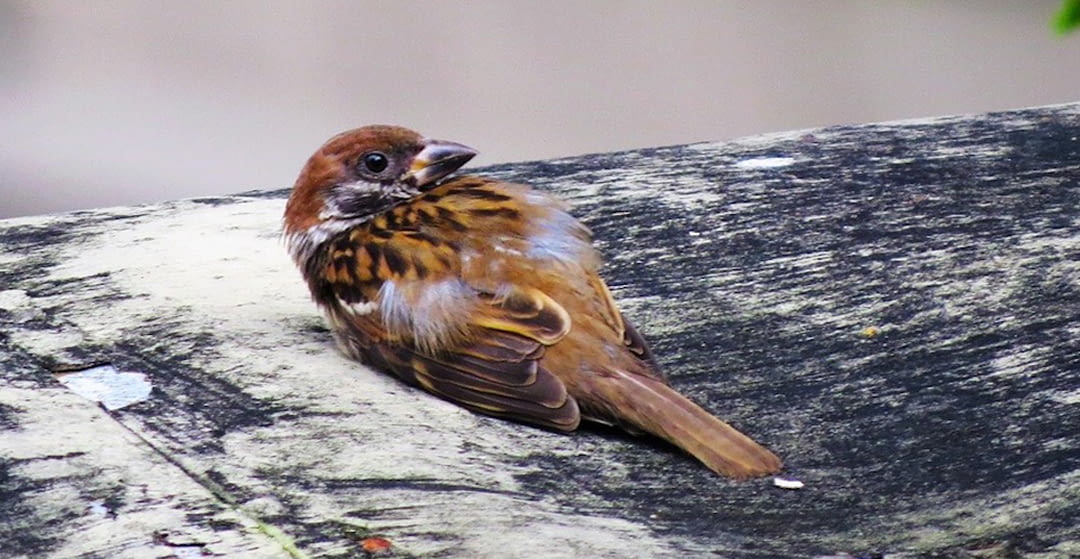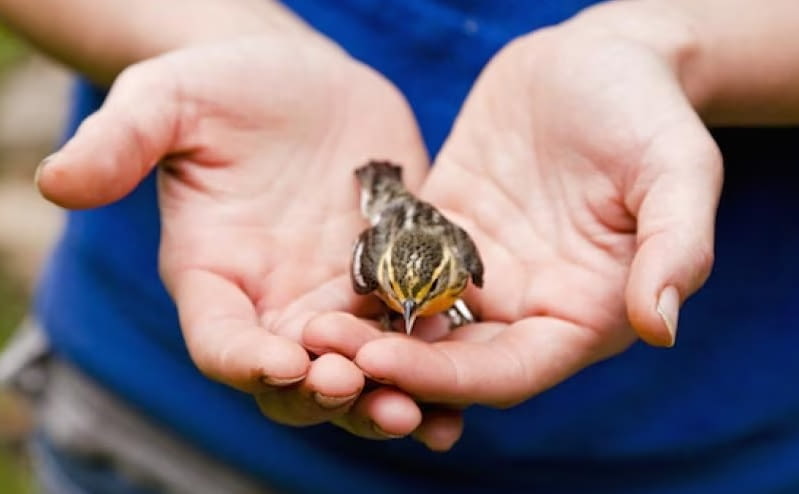
Normally, when the end of spring arrives and the high temperatures of summer begin to be felt, there are many chicks that jump out of their nests even if they still do not know how to fly.
It is also possible to find an injured bird on the ground from other causes, such as a predator attack.
Wild birds live surrounded by dangers: crashes against windows, encounters with cats or falls from the nest. It is very common to find a bird injured or very weak.
The chances of survival for a badly injured bird are slim. Birds have a high metabolism and relatively little blood in their bodies. Therefore, they do not last long with open wounds. Added to this is the danger of cats, martens or foxes. That's why it's so important to look closely and help an injured bird as soon as possible.
But what is the best way to proceed? We explain what to do if you find an injured bird.
FIRST AID
A) Observe him: what kind of injury does he have?
B) Protect the bird: pick up the bird carefully with a towel and place it in a cardboard box with kitchen paper and vents
C) Ask for help: take the bird to a specialized veterinarian or inform a wildlife rehabilitation center.
A) OBSERVE HIM: WHAT KIND OF INJURY DOES HE HAVE?
Before looking for a box in which to place the badly injured bird, we have to make sure that it really needs medical help. With visible injuries, such as wounds, bites, or broken bones, the situation is usually clear. In this case, you must go directly to point B. PROTECT THE BIRD.
On the other hand, with weak birds without visible injuries, things change. Distinguishing a sick bird from a healthy one is quite difficult for someone inexperienced. If you are not sure, it is better to leave it where it was and watch it for a while.
Can walk? Does it wobble or fall? Can fly? Birds are skittish animals and often take flight when a person gets too close to them. If you are sitting or lying on the floor looking weak, you most likely need help.
Flights against the windows
One of the most common injuries to birds is head injury caused by hitting a window. Hopefully the bird will only have a minor concussion and will be able to fly again after a short recovery.
If we discover a bird lying face up on the terrace or balcony, it should not be touched directly; For now, it is appropriate to observe it. The birds are not used to being touched. If we take it or caress it with our hand, we will cause unnecessary stress that is completely avoidable in this situation. As we pointed out, the correct thing to do is to observe him to see if he is really hurt.
If, when looking more closely, we discover wounds on the body, beak, eyes, or wings, the right thing to do is take it to the vet for an examination, if possible, as indicated in points B and C.

B) PROTECT THE BIRD
If the bird needs vet or rescue center care, it should be carefully picked up and placed in a cardboard box with towels or kitchen paper.
· To catch it, lay a towel or blanket over the bird. In this way, it will be possible to lift him off the ground more easily and prevent him from hurting himself. Injured birds may scratch or nip with their beaks out of fear. With birds of prey you have to be especially careful.
· When holding it, care must be taken not to tighten it too much. If you put too much pressure on your chest or belly, it can cause deadly breathing problems. Therefore, it should only be touched to place it in the box. Holding it too long or petting it, even with good intentions, will only scare it off.
· To transport it and provide first aid, a cardboard box with towels, rolls of kitchen paper or several pages of newspaper can be used. Thus, the bird's feces will be collected and it will be warm, comfortable and protected. Important: The cardboard box must have holes for breathing and a sufficient size.
C) TAKE THE BIRD TO THE VETERINARIAN OR A CENTER
The transfer to the vet or a rescue center is a great stress for the injured bird. If we take it to the vet or a specialized clinic ourselves, we must make sure that it is stable for transport. If any doubt arises, it is convenient to call the veterinarian or the destination center to ask for advice.
If you are transported by car it is important to fasten the cardboard box with the seat belt and drive carefully.
Feed the bird?
If the transfer is very long (more than an hour), it may be necessary to give him water and food. If he is very weak and cannot eat grains on his own, the correct thing to do is to give him a glucose solution. Cooked egg white also serves as emergency food for all bird species (including young ones).
Open wounds or acute bleeding
If the injured bird has open wounds with intense bleeding, we must try to heal them immediately. Covering the wound with a soft, dry cloth and, if possible, applying a disinfectant. A lightly pressed cotton pad can also be used to stop the bleeding.
In short, the important thing is to observe
Many injured birds can be helped if they are found and cared for early. Broken bones, wing injuries, head injuries, bites, and infectious diseases can be treated by an avian veterinarian.
If the injuries are too severe, the vet will put the bird down to end its suffering. On the other hand, if the care has been successful, a rescue center will take care of their recovery and stabilization. The bird will prepare for an independent life in the wild and, under professional supervision and with a little luck, will soon be able to fly free.



